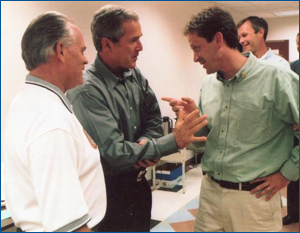

President George W. Bush spent much of Labor Day 2001 in Northeastern Wisconsin. As the local congressman in those days, it was my honor to accompany him as he marked the occasion with a visit to a newly constructed Council of Carpenters Training Center.
I remember watching him strap on a carpenter’s apron and hang drywall for the cameras. He was cracking jokes, the cameras were flashing, and everyone was smiling.
I also vividly remember our long drive back to the airport because it was my first private time with the relatively new president. As we went along, I asked him what issues he hoped to tackle.
“Well, Green,” he answered in his pleasant, cocky tone, “I want to work on energy and education, I want to get the economy moving and take on immigration. . .” He went on to tick off an impressive list of items. All of them were domestic.
Eight days later was 9-11.
Weeks after that, I was in a group that met with the President. When it was my turn to shake hands, I asked if he remembered our drive and that conversation. He looked me in the eye, and shook his head. “Blown clear out of the water,” he said softly.
These days, we’re facing tough domestic challenges. Families are struggling, unemployment is still high and our debt burden is threatening our nation’s long term economic health. And that’s just where the list begins.
But as we look for common ground and try to craft solutions to these pressing concerns, we should never forget that we live in a troubled world. We might wish it were otherwise — that we needed to think only about what takes place here at home — but that’s simply not the case, and it never really has been.
We need to remain strong because we are the world’s leading power and a force for good. Strength means making sure that our men and women in uniform have everything they need to be safe and successful. However, in this new century, strength also means much more. We need a full range of diplomatic tools, including a well-trained diplomatic corps that can effectively project our values and also advance our interests. We need programs and policies that boost free markets and open up entrepreneurial opportunities – not just because we want American businesses to make more profit, but also because we know that promoting economic freedom can have a transformative effect in lifting up families and societies. We need the humanitarian resources to help those in greatest need and to prevent the kind of despair that extremists all too often exploit.
It’s natural for Americans, especially during tough times, to be a little wary of the responsibilities that come with our role in the world. But we cannot ignore that there is extreme poverty and injustice in the world, that there are families in far off lands yearning for freedom or struggling against tyranny, that there are threats to our security and way of life, and that our farmers and businessmen need to compete for global markets .
It would be great if we could think only about pressing challenges here at home, but as we learned all too painfully ten years ago, that’s not the world we live in.
The world needs us strong in every way.